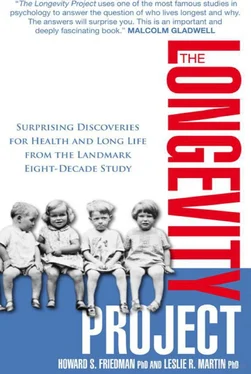By the end of the twentieth century, 70 percent of the Terman men and 51 percent of the Terman women had died. It was the unconscientious among them who had been dying in especially large numbers. This confirmation in adulthood was particularly impressive because personality was being measured differently. Conscientiousness in childhood was measured by parent and teacher ratings. Conscientiousness in adulthood was measured by self-report questionnaires—our analyses of how participants described themselves and their activities. In both cases—childhood and adulthood—conscientiousness was the key personality predictor of long life. 8 8 For our study of conscientiousness in childhood and adulthood, see L. R. Martin, H. S. Friedman, and J. E. Schwartz, “Personality and Mortality Risk across the Lifespan: The Importance of Conscientiousness as a Biopsychosocial Attribute,” Health Psychology 26 (2007): 428-36.
Why Do the Conscientious Stay Healthier and Live Longer?
We thought of three possible reasons for why conscientious individuals tend to stay healthier and live longer. To our great surprise, all three are true. The first reason, perhaps most obvious, is that conscientious people do more things to protect their health and engage in fewer activities that are risky. They are less likely to smoke, drink to excess, abuse drugs, or drive too fast. They are more likely to wear seat belts and follow doctors’ orders. They are not necessarily risk averse but they tend to be sensible in evaluating how far to push the envelope.
The second, and least obvious, reason for the health benefits of conscientiousness is that some people are biologically predisposed to be both more conscientious and healthier. Not only do they tend to avoid violent deaths and illnesses linked to smoking and drinking, but conscientious individuals are less prone to a whole host of diseases, not just those caused by dangerous habits. We and others are uncovering this startling finding again and again—conscientious folks are less likely to die from all sorts of causes. While we are not yet sure of the precise physiological reasons, it appears likely that conscientious and unconscientious people have different levels of certain chemicals in their brains, including serotonin. Serotonin is the neurotransmitter targeted by antidepressant drugs like Prozac, Paxil, and Zoloft. Individuals with low levels of serotonin tend to be much more impulsive. Importantly, serotonin is also necessary to regulate many health-relevant processes throughout the body, including how much you eat and how well you sleep.
This is no cause for fatalism, however. Neurotransmitter levels can change over time, and being biologically predisposed toward certain physiological processes is not a death sentence any more than being predisposed to depression means you will absolutely fail to thrive and find satisfaction in life. As we will see, some Terman subjects who started out low on conscientiousness (i.e., who were impetuous and impulsive children) led long and healthy lives.
We’ve saved the best for last. The most intriguing reason conscientious people live longer is that having a conscientious personality leads you into healthier situations and relationships. In other words, it is not only that conscientious people have better health habits and healthier brains, but also that they find their way to happier marriages, better friendships, and healthier work situations. That’s right, conscientious people create healthy, long-life pathways for themselves.
In and Out of Conscientiousness
Some people do change, and they travel down a path that leads them far away from the habits of their youth—for good or for ill. While we found a consistent link between dependable kids and their future adult selves, we also confirmed that human beings can be inconsistent creatures. Some wild frat boys quit drinking the morning after their fortieth birthday. Cautious others abandon their sensible lifestyle in midlife and buy a red sports convertible. How is a change in long-term conscientiousness relevant to health?
We decided (with the advice of Dr. Joe Schwartz) to compare four kinds of people:
• The first is someone like Patricia who was highly conscientious (in the top quartile) in both childhood and adulthood.
• The second is an individual who was conscientious in childhood but turned unconscientious by adulthood.
• The third is someone, such as the tactful and charismatic James, who was decidedly low on this trait as a kid but became one of the most conscientious subjects by the time he reached young adulthood.
• The fourth kind was unconscientious in childhood and remained so in adulthood.
We found that those Terman participants who scored high at both points in time had the lowest risk of dying at any given age. Those who scored low at both points in time had the highest risk of dying. And the others, those who had changed their level of conscientiousness, were in between.
The nineteenth-century Lithuanian scholar Yisroel Lipkin (known as Rav Yisroel Salanter) reportedly said that three things can be learned from a train: (a) if you’re late a minute you can miss it, (b) even a tiny move off the tracks causes a catastrophe, and (c) if you travel without a ticket you get punished. 9 9 For information on Yisroel Lipkin (Rav Yisroel Salanter), see D. Katz, The Musar Movement: Its History, Leading Personalities and Doctrines (Tel Aviv: Orly Press, 1975); or I. Salanter, I. Blaser, Z. Miller, and E. Linas, Ohr Yisrael: The Classic Writings of Rav Yisrael Salanter and His Disciple Rav Yitzchak Blazer (Southfield, MI: Targum, 2004).
We do not have a conscientiousness score for Mr. Lipkin, but staying on track with the proper tickets does seem to be an excellent metaphor for a conscientious lifestyle.
But how can we be sure that conscientiousness is as important to us in the twenty-first century as it was to Dr. Terman’s subjects (or to Rabbi Lipkin, for that matter)? Our highly conscientious and talented recent graduate student (and now Ph.D.) Margaret (Peggy) Kern addressed this question. Peggy knew that the past decade had seen a number of researchers following up on our findings and conducting many excellent new studies on personality and health. Why not gather them together and combine the results using the statistical technique called meta-analysis?
Although meta-analysis sounds like a Kantian proposition or a therapy for aging Freudians, it is really a fairly straightforward mathematical tool to combine the results of many studies into a single summary. Peggy computer-searched for all the studies ever published that included a conscientiousness-related trait—prudence, responsibility, self-control, or impulsivity—and a measure of longevity. She found twenty studies, with a total of about nine thousand participants. We combined those studies, and the results clearly confirmed our Terman findings—people ranking higher in conscientiousness were less likely to die at any given age. 10 10 For our scientific review of conscientiousness and long life, see M. L. Kern and H. S. Friedman, “Do Conscientious Individuals Live Longer? A Quantitative Review,” Health Psychology 27 (2008): 505-12.
This held true for young people and it held true for sixty-five- to one-hundred-year-olds.
Personality and Chronic Disease
Conscientiousness predicts long life, but what about its relevance to serious chronic disease? Surely other factors matter quite a bit—would they override the importance of conscientiousness? What about diseases like diabetes, hypertension, stroke, lumbago, depression, and bladder disease? Could prudence possibly be relevant?
Читать дальше











